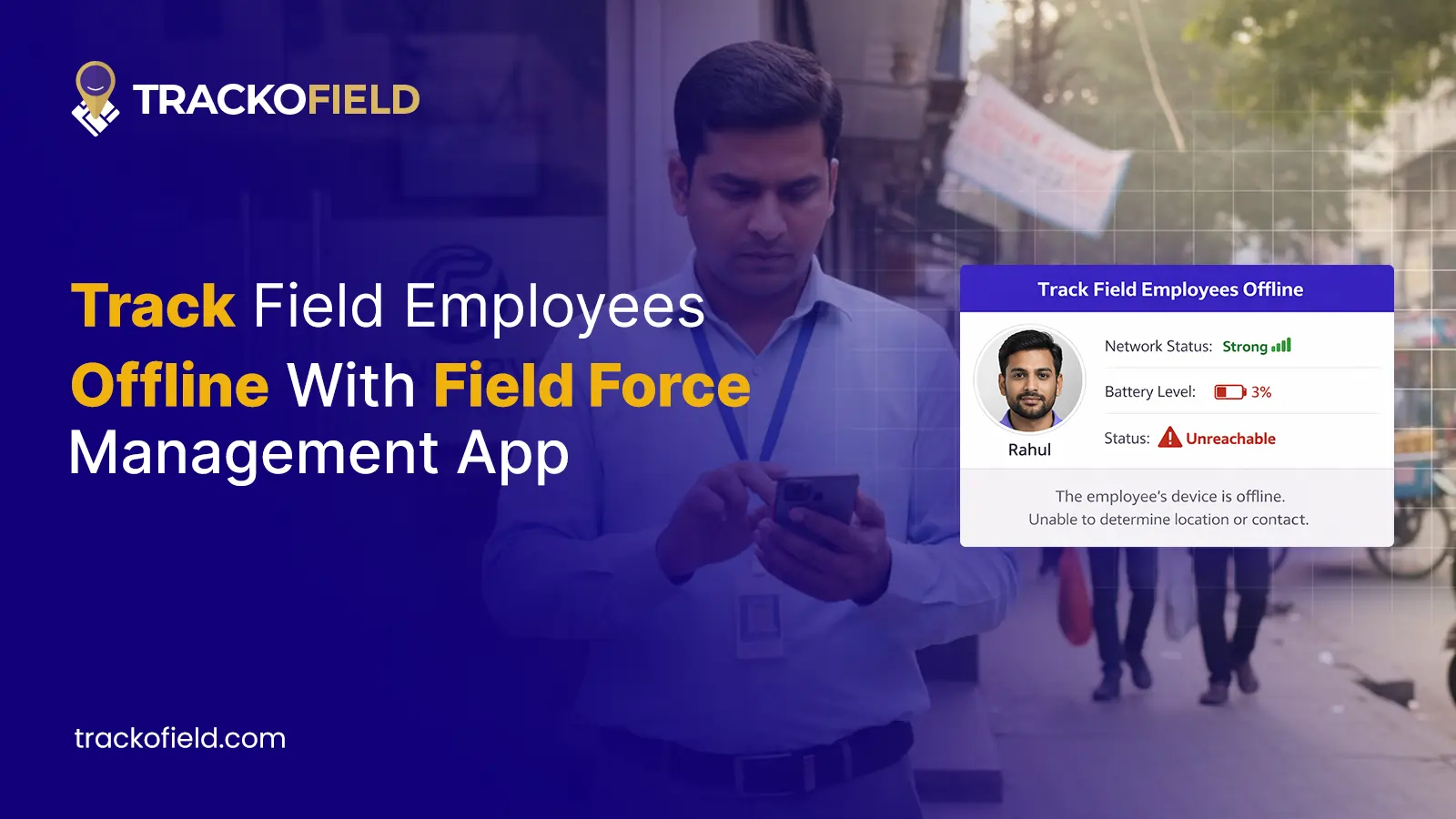-
TrackoBit
Manage commercial vehicles with the new-age Fleet Management Software
TrackoBit -
TrackoField
Streamline your scattered workforce with Field Force Management Software
TrackoField -
Features Resources
-
Blog
Carefully curated articles to update you on industrial trends. -
White Paper
Insightful papers and analysis on essential subject matters. -
Glossary
Explore an alphabetical list of relevant industry terms. -
What’s New
Get TrackoBit & TrackoField monthly updates here. -
Case Study
Explore the cases we solved with our diverse solutions. -
Comparisons
Compare platforms, features, and pricing to find your best fit.
-
About Us
Get to know TrackoBit: our team, ethos, values, and vision. -
Careers
Join the most dynamic cult of coders, creatives and changemakers. -
Tech Support
Learn about our technical support team and services in detail. -
Events
Check out the exhibitions where we left our marks and conquered. -
Contact Us
Connect with us and let us know how we can be of service.
Top Difference Between Sales Bonus, Commission & Incentives
- Author:Nandita Gupta
- Read Time:7 min
- Published:
- Last Update: December 5, 2025
Table of Contents
Toggle
Unfolding differences between sales bonuses, commissions, and incentives. Know when these three financial rewards are paid out and at what ratio.
Table of Contents
Toggle
The terms “sales bonus,” “commission,” and “incentives” might seem confusing due to their similar nature. While they share some common ground, they are distinct in purpose and application. But one thing is common between these three which is to motivate employees, retain them for longer, and value their efforts.
An organisation that pays all these three components in some shape, form, and extent often ends up retaining the most motivated employees.
Let’s clarify the differences and break down what sets a sales bonus, commission, and incentive apart.
Difference Between a Sales Bonus, a Commission, and an Incentive
Let’s explore the main differences between these three popular terms of financial rewards.
What is a Sales Bonus?
A sales bonus is a fixed cash reward that employees are promised to receive once they fulfill a given sales target. Most companies define this pay type as either a fixed sum or a fixed percentage of generated revenue.
For example, there can be two cases…
Case 1 – Fixed Sum
Suppose Steve, an MR sales rep is asked to cross sales of $40,000 and in return is promised a fixed amount of sales bonus of $2000.
Case 2 – Fixed Percentage of Predetermined Sales Milestone
Again if Steve reaches the sales of $40,000, he will receive 10% of the generated revenue, which would be $4000.
💡When companies should pay “Sales Bonus”
Any product or field service business should pay a sales bonus when employees exceed the set sales targets and add to the business growth.
What is a Commission Pay?
Commission pay is another financial reward in which employees are paid a fixed percentage of the sales revenue they generate. This pay is either a percentage of total sales made or a fixed amount per sale. The more sales the sales team makes, the more commission they will get credited alongside their salary.
Sales Bonus and Commission – Don’t They Sound Similar?
People get confused because both of these industries’ standard terms seem similar in meaning. However, there are plenty of differences, as explained below.
| Features | Sales Bonus | Commission Pay |
| Purpose | A financial reward is given for achieving specific sales targets or milestones. | Rewards tied directly to per sales made. |
| Structure | The amount is pre-determined and not tied to individual sales. | It is a percentage of sales revenue. |
| Flexibility | Can be decided based on team performance or overall company success. | It’s a fixed percentage of achieved sales. |
| Timing | Credited periodically, could be annually or quarterly. | Credited after each sale or maybe regularly. |
| Motivation | Motivates individuals and teams to achieve more growth. | Encourages more individual sales performance. |
| Example | Employees get a $1,000 bonus for exceeding quarterly targets. | Employees get a 5% commission on each sale. |
What is an Incentive Pay?
Incentives are an umbrella term for financial rewards that are not just paid only when promised sales targets are met, it can be literally paid for any small to big positive impact an employee drives.
Those impacts could be:
- Promoting more product sales (like medical MRs promoting more medicine batches)
- Ensuring more up-sells and cross-sells, or selling goods with high margins
- Getting multiple warranty registrations
- Making duty calls more than the target
- Successfully completing upskilling courses and earning a certification (yes, some companies when you upskill).
Paying such an amount and reasons vary from company to company. Rewarding incentives aim to motivate and encourage employees so they strive for more.
Also, such payouts can be non-monetary. For top performance, employees can be reimbursed with trips, gifts, shopping vouchers, and even handsome bonuses.
How Incentive is Different from a Bonus? Are they the Same?
Both terms are often interchangeably used because, in a way, bonus is a subset of incentive. The similarity between these two is that they are paid separately from the salary and commissions.
So, how are they different?
Bonuses are paid once the employee hits their targets. Incentive on the flip side, is decided ahead of time and granted for events that bring positive impacts.
| Features | Bonuses | Incentives |
| Meaning | A financial reward is given for achieving specific sales targets or milestones. | An amount paid out for any extraordinary performance rather than just sales. |
| Purpose | To reward sales achievements. | To encourage more performances in the future. |
| Timing | Awarded either quarterly or annually. | Awarded before or during the performance period. |
| Structure | Can be paid as a fixed amount or a percentage | Can be paid as more financial rewards, coupons, or redeemable points. |
| Flexibility | Tied specifically to sales performance only. | Can include non-monetary rewards also. |
| Predictability | Is quite predictable and announced in advance. | Not foreseeable and not shared in advance. |
| Examples | Year-end bonuses are credited for meeting sales targets. | A fixed sum or incentive trip to top performers. |
How Incentives are Different from the Commission?
The commission pay is granted when the desired outputs as targeted sales numbers are achieved. It consists basically of tangible results. Incentives, on the other hand, are a way to motivate employees with financial rewards which can be in the form of bonuses, encashments, gifts, and even holiday packages for ongoing progress or achievements.
Most organisations prefer paying both types of financial rewards. It’s because together these components help build a highly driven and motivated team that’s always working hard to push the sales process.
It’s like a win-win situation for both employees and the management.
| Factors | Commission | Incentives |
| Meaning | Paid based on a percentage of sales achieved. | Paid after meeting great sales or other growth-led performance. |
| Structure | Includes a fixed percentage of revenue on sales made. | Can be paid as bonuses, trips, gifts, etc. |
| Pay Cycle | Earned regularly besides every sales cycle. | Paid during the performance period. |
| Predictability | Direct correlation with sales, predictable based on performance | Can vary in timing and structure, and is not always predictable |
| Motivation | Encourages individual sales effort | Drives specific behaviors or performance beyond just sales |
| Flexibility | Typically, a fixed percentage of sales made. Can vary by product or overall quota. | Highly flexible, can be tailored to different goals |
| Example | 5% commission on each sale made | Incentive trip for achieving the highest sales growth |
💡 When companies should pay “Commission”
Commission is a popular reimbursement model for industries like retail, real estate, and insurance, where sales are derived from prospecting and selling to clients. Some organisations reimburse base salary + commission, while some just pay just commission.
As an organization, you must go for a this pay when:
- There is scope to set a fixed budget to pay the sales rep.
- When you want to motivate your reps, and drive more sales from high-level accounts.
Manage Bonuses, Incentives & Commissions with TrackoField
Simplify your field staff’s compensation management with TrackoField. At clicks, effortlessly track and manage salary components, bonuses, incentives, and commissions — all in one place.
It’s time to switch to the most error-proof and enhanced accuracy! Input tailored compensation plans to our payroll management system and run a highly motivated and aspirational team.
What more do you get?
- A system that integrates with your CRM, salesforce, and ERP & accounting tools.
- Auto-updation of accurate attendance, leave, and salary data.
- Clear bifurcation of salary components and auto payslips generation.
Make a switch. Trust us, you won’t regret it!
FAQs on Differences Between Sales Bonus Commission and Incentive Pay
-
What is a sales bonus?
A sales bonus is an incentive provided as an extra percentage over the salaries to motivate the employees.
-
What is a commission pay?
Commission pay is an incentive given to employees, often as a fixed percentage of the targetted sales achievement.
-
What is an Incentive pay?
Incentive pay is a financial reward or additional compensation reimbursed to employees for achieving specific performance, behavior, or targets. The aim of incentives is to make employees feel motivated and strive for more.
Nandita is the Team Lead for Content Marketing at TrackoBit, bringing over a decade of experience in B2B, B2C, and IoT sectors. She has a proven track record of helping Read More
Related Blogs
-

How to Track Field Employees Offline With Field Force Management Software
Mudit Chhikara February 11, 2026Use field force management software to track field employees offline and ensure managers never lose visibility of on-ground operations.
-

How AI-Powered Field Force Management Simplifies Field Operations With Analytical Dashboard
Mudit Chhikara February 10, 2026How AI-powered field force management enhances field operations using AI manager bot and analytical dashboard.
-

Grameen Credit Score and the Quiet Redesign of Rural Lending
Pulkit Jain February 9, 2026Rural lending doesn’t usually go wrong at approval. It drifts when what’s happening on the ground stops being visible.
-

How NBFCs Can Reduce NPAs Using LMS + LOS + FFA Integration
Mudit Chhikara January 30, 2026Here’s how NBFCs can smartly integrate LOS, LMS, and FFA software to reduce NPAs and ensure seamless field operations.

Subscribe for weekly strategies to boost field team productivity.
Your inbox awaits a welcome email. Stay tuned for the latest blog updates & expert insights.
"While you're here, dive into some more reads or grab quick bites from our social platforms!"Stay Updated on tech, telematics and mobility. Don't miss out on the latest in the industry.
We use cookies to enhance and personalize your browsing experience. By continuing to use our website, you agree to our Privacy Policy.





































